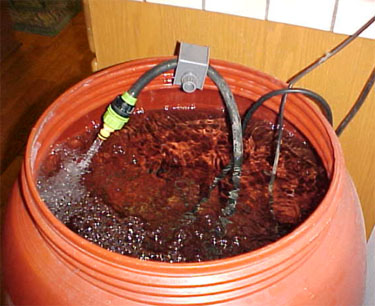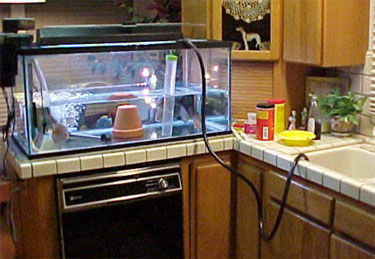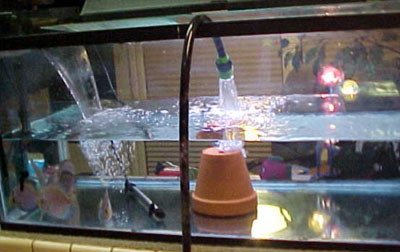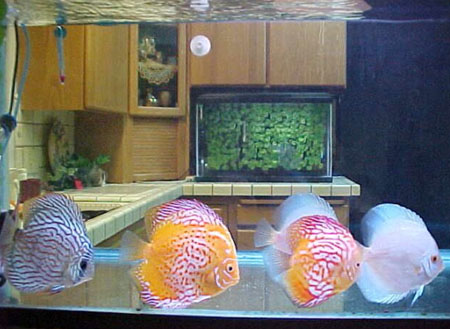by Carol Roberts
Nothing is more important for discus health than warm, clean water and regular water changes. Discus do not have to be kept in a pH of 6.0, they can live in a wide range of water hardness and pH. If your water hardness falls between GH 3 – 14 and your pH falls between 6.0 and 8.5 your aged tap water should be fine for your discus. It is more important for the hardness and pH to be the same from day to day than to try and create a  “perfect” number with chemicals. Discus eggs do require water between GH 3 – 8 for a higher hatch rate.
“perfect” number with chemicals. Discus eggs do require water between GH 3 – 8 for a higher hatch rate.
I recommend daily water changes of 30 to 50 percent for growing juveniles. Adults also like daily water changes, but do well with 3 or 4 water changes per week.
What are the steps for doing water changes? Most of us have a storage container, like a plastic barrel to store our water. We heat and circulate the water. Circulation or agitation releases trapped gasses like CO2.
The first step is to siphon out the old water and any uneaten food and feces on the floor of the tank. Decorations like plants, wood and rocks collect a lot of dirt underneath them. In the kitchen I let the tank drain into the sink.
floor of the tank. Decorations like plants, wood and rocks collect a lot of dirt underneath them. In the kitchen I let the tank drain into the sink.
In other tanks I run my siphon hose out the back door and let the water run onto the lawn. Tanks close to my bathroom are drained into the bathtub. Once you have drained the tank down 30% to 50% remove the siphon hose. If the walls or floor of the tank are dirty you can wipe them down with white paper towels or a sponge. If you have a pre-filter on the water intake of your filter you would rinse it at this time.
 After adding a dechlorination product (if needed) you will refill your tank with water that is very close in temperature and pH to the water removed. We call this aged water. You age your water by letting it heat and circulate for 3 to 24 hours depending upon the hardness of your water and the agitation used. The harder the water is agitated the quicker the pH stabilizes.
After adding a dechlorination product (if needed) you will refill your tank with water that is very close in temperature and pH to the water removed. We call this aged water. You age your water by letting it heat and circulate for 3 to 24 hours depending upon the hardness of your water and the agitation used. The harder the water is agitated the quicker the pH stabilizes.
Some people use buckets to transport water to the tank. I have a pond pump and hose and pump it from my storage container to the fish tank. It’s so much easier on your back.
Usually your water from the tap has a different pH than the water in the tank. Aging or agitating the water releases CO2 and stabilizes the pH. Generally the pH rises or in some cases lowers as the trapped gasses are released. Testing pH is very easy. You can buy a simple kit from most fish stores or even Wal-Mart.
Reverse Osmosis or RO water is not necessary for juveniles or most adults. In hard water areas you may need RO to hatch discus eggs. Generally most of us have water that is fine for growing out discus.
 If your water is very soft you will need to add minerals so the pH doesn’t crash and to aid in discus growth. Again you will need to test your water to find out how hard or soft it is. This is a different test from pH. If you have city water your water department can give you this information or you can also purchase GH and KH test kits to easily measure your water’s hardness and alkalinity.
If your water is very soft you will need to add minerals so the pH doesn’t crash and to aid in discus growth. Again you will need to test your water to find out how hard or soft it is. This is a different test from pH. If you have city water your water department can give you this information or you can also purchase GH and KH test kits to easily measure your water’s hardness and alkalinity.
The first line of defense against illness is clean water, clean tanks and clean filters. When in doubt do a water change.


Thanks Carol, important to make the effort to establish a sound waterchanging routine. I love thw plastic water barrel to age the water, girdt time I have seen this. Thank you!
Thank you for this article, I am wondering to buy a fish for my children.